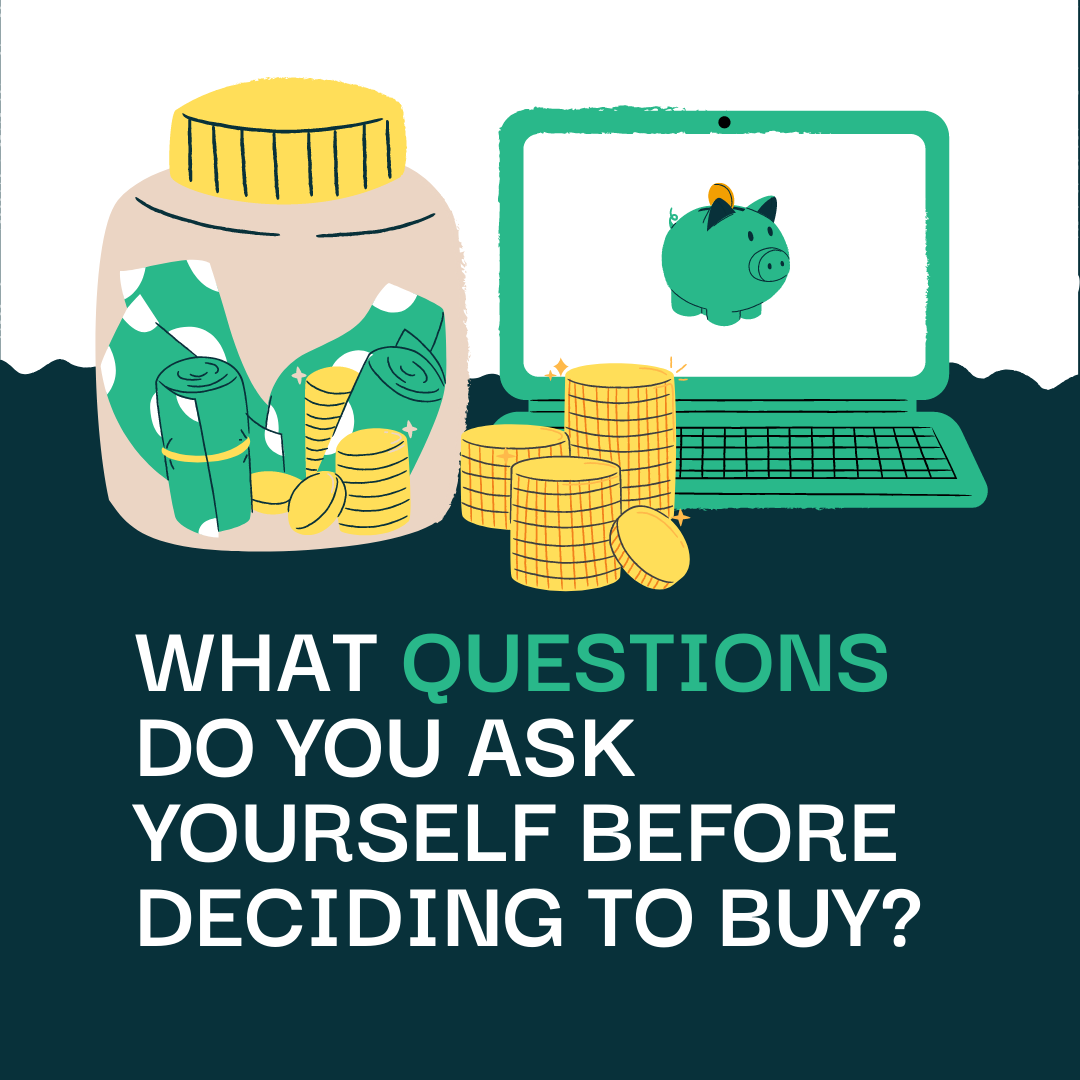
28 Dec What questions do you ask yourself before deciding to buy?
Many decisions we make in our daily life have to do with buying and consuming goods and services. From choosing which brand of cereal to pick at the supermarket to deciding whether or not to buy a new jacket for the winter to comparing different car insurance companies.
However, many of us don’t have a consistent approach when making buying decisions. Asking yourself the right questions can truly revolutionize how you think and significantly improve your personal finances,

The Consumer Buying Process
Even though we are unaware of it, most sellers’ marketing specialists spend hours analyzing our consumer behavior. In order to turn us into buyers of their products, they follow each step we take, from expressing interest in a product to buying it to rating it.
Marketers do this to increase the likelihood that we will choose the brand they work for, but consumers can switch the power balance in their favor by consciously recognizing these steps and using them to their own advantage.
Here are the main steps of the consumer buying process.
- Recognizing a need or desire – We typically buy things because they satisfy or fulfill a desire. We purchase a bed because we need something to sleep on and we buy a cinema ticket because we enjoy being entertained. We aren’t always fully conscious of the moment when a need or desire arises. When we are waiting in line at the supermarket, and we see a tasty candy bar next to us, we may just grab it and buy it instead of reflecting on whether it’s a necessary purchase and how much it’s going to impact our available income for the rest of the day or week. Making an effort to become fully aware of these impulses and unconscious thoughts can help us take control instead of letting a brand’s or store’s marketing department move the threads in the shadows.
- Conducting research – When it comes to essential or expensive products, we usually behave less impulsive and spend more time and energy researching different ways to satisfy a need or fulfill a desire. For example, when we realize that we need a new car, we’re unlikely to just drive to the car dealer and buy one right away. We will look for information on available different brands and models while taking into account our budget. That’s one of the reasons why it’s so important to have a clear understanding of our needs and desires. It allows us to collect the right information during the research stage.
- Comparing different options – After gathering enough data on available brands, as well as product features, reviews and prices, we move on to comparing different alternatives in order to choose the one that best satisfies our needs or wishes. Not enough people take the time to evaluate options, so they end up buying the first product or service that “feels right”. When buying a new laptop, you may spend only a few hours comparing different brands and models before purchasing one. A few weeks later, you may regret it after accidentally walking in front of a shop window and seeing a cheaper laptop with the same exact quality and features. Take your time to evaluate each option. Remember that once you buy a product, you can’t just reverse the purchase when you realize it wasn’t the best possible pick.
- Deciding whether to make the purchase or not – Comparing different alternatives and picking the best one for you is also a necessary step to determine whether to proceed with the purchase altogether or not. Let’s say you are looking for a new sofa. You visit five different stores, get information on different brands, narrow the choice down to a few models, and choose the best one possible. Is it a sufficient improvement compared to your current one? Does it justify the purchase? Many consumers forget that “not buying” is also an option. Just because you wish for a new item, it doesn’t mean that buying it is actually the best choice you can make.
- Post-purchase evaluation – After buying a product or service, you’ll be able to consume it (or use it repeatedly) and determine whether it lives up to expectations. Evaluating your purchases provides you with helpful data to decide whether to rebuy that product in the future or not. This is very important in the case of goods and services you buy weekly (like groceries and household products) or monthly (like clothes and airline tickets).
Think of a few products you bought recently and replay all the stages of the consumer buying process in your head.
Were you conscious of what was going on every step of the way, or were you driven by your impulses and external marketing influences? Did you dedicate enough time to each stage, or did you try to rush things? Observing your current consumer behavior and assessing how effective it is at fulfilling your needs or desires (as well as respecting your budget limitations), is a great way to improve it over time.

How much is your money really worth when making a large purchase?
We are used to giving each good and service a value based on their price. But is a small Toyota worth the same to a full-time blue-collar employee earning $40,000 a year compared to a small investor generating a passive income of $100,000 from its stock and real estate portfolio alone? Or is a new plasma TV worth the same to a person with a $30,000 outstanding credit debt compared to a debt-free individual? Is a new stereo worth the same if you have to forget a new bicycle to buy it compared to a situation in which you can buy both?
How much we work, earn, and owe ends up defining the real value of things from our unique individual perspective.
If you want to look at things from the right perspective, there are some very useful questions you can ask yourself before making purchases. For example, how many minutes, hours, weeks, or months of work is each purchase worth? Which share of your income do you have to spend to buy a certain good or service? What other purchases are you giving up to buy a product?

